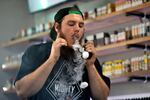A retail ban on flavored tobacco and nicotine products in Multnomah County is moving forward.

In this Tuesday, Sept. 3, 2019, photo, Devin Lambert, the manager at Good Guys Vape Shop, exhales vapor while using an e-cigarette in Biddeford, Maine.
Robert F. Bukaty / AP
The Multnomah County Board of Commissioners on Thursday unanimously approved the first reading of an ordinance that forbids retailers from selling tobacco and other nicotine products that have added flavors, including mint and fruit flavors. They’ll consider it a second and likely final time on Thursday, Dec. 15.
If passed, the ordinance would become effective in January 2024.
“This is an area in which we can make a life-saving difference through public policy,” County Chair Deborah Kafoury said. “The alternative — leaving the sale of flavored tobacco untouched — will only further solidify nicotine and tobacco use as the leading cause of preventable death in our community.”
Under the proposed ordinance, county inspectors will be tasked with enforcing the new rules through the county’s tobacco retail license program. The ordinance doesn’t prevent individual people from using flavored tobacco or nicotine products; rather, it prevents retailers from selling them. If a retailer breaks these rules, the county could revoke its license to sell any tobacco products.
During Thursday’s meeting, commissioners rejected an amendment proposed by Commissioner Lori Stegmann that would have grandfathered in existing hookah lounges. Hookah is a smoking device from which people inhale flavored tobacco topped with burning charcoal. It’s especially popular in the Middle East and North Africa.
Stegmann said hookah lounges provide a social space for young people, particularly people of color, and they add a “third place” outside of home and work where marginalized groups can feel safe.
“By adopting this minor exception, we could preserve just three places where people could be fully seen and accepted,” Stegmann said. “I believe this is the right thing to do and reflects the needs of our community.
Salam Zaniel, owner of 007 Hookah Lounge in Portland, testified on the proposed amendment.
“As a Muslim, I don’t drink and neither do my friends, so we go to the hookah lounges to hang out and see each other instead of going to bars or clubs,” he said.
All other commissioners — including Commissioners Jessica Vega Pederson, Susheela Jayapal, and Sharon Meieran — voted against the amendment.
“What it comes down to, for me, is they are selling a product that is so incredibly damaging,” Meieran said.
Meiran highlighted a statistic from the Centers for Disease Control and Prevention: During a typical one-hour hookah smoking session, users may inhale 100 to 200 times the amount of smoke they would inhale from a single cigarette.
Multnomah County is the second Oregon jurisdiction to enact a ban on flavored tobacco and nicotine products. The first was neighboring Washington County, but its ordinance was overturned by a circuit court judge in September. Although the fate of that ordinance is still moving through courts, a legal team working for Multnomah County says the judge’s decision was “flawed” and “will be reversed in appeal,” according to a letter written to Campaign for Tobacco-Free Kids, a national nonprofit organization.
Multnomah County’s ban on flavored tobacco is intended to prevent tobacco use among children and teens, which health officials say can develop into lifelong nicotine addiction. During public meetings with the county board, health leaders have said fruity flavors like mango and blueberry make nicotine products, including vape pens, more appealing to young people, and are often advertised directly to them. Officials with the county’s tobacco licensing program say an average of 25% of inspected retailers end up selling tobacco products to underage inspectors.
Health leaders also say ads for mentholated cigarettes and small cigars target people who identify as Black, Latinx, and Native American, reinforcing historical health inequities.
About 16% of adults in Multnomah County regularly smoke cigarettes, according to data presented to the board on Thursday. About 36,090 people in the county have been diagnosed with a serious illness caused by tobacco.
Conversations about the dangers of e-cigarettes and flavored tobacco in the county date back to 2012, when health equity groups first started briefing the board about health impacts on young people. These conversations cropped up again years later in 2019 when county health leaders briefed the board on a multi-state outbreak of severe lung disease related to vaping.
The onset of the COVID-19 pandemic in 2020 paused conversations about potentially banning flavored tobacco products until this summer. After an information briefing from the county health department, Kafoury asked health administrators to come back with a draft policy, which they did in October. The draft ordinance had its first public hearing on Nov. 28.
